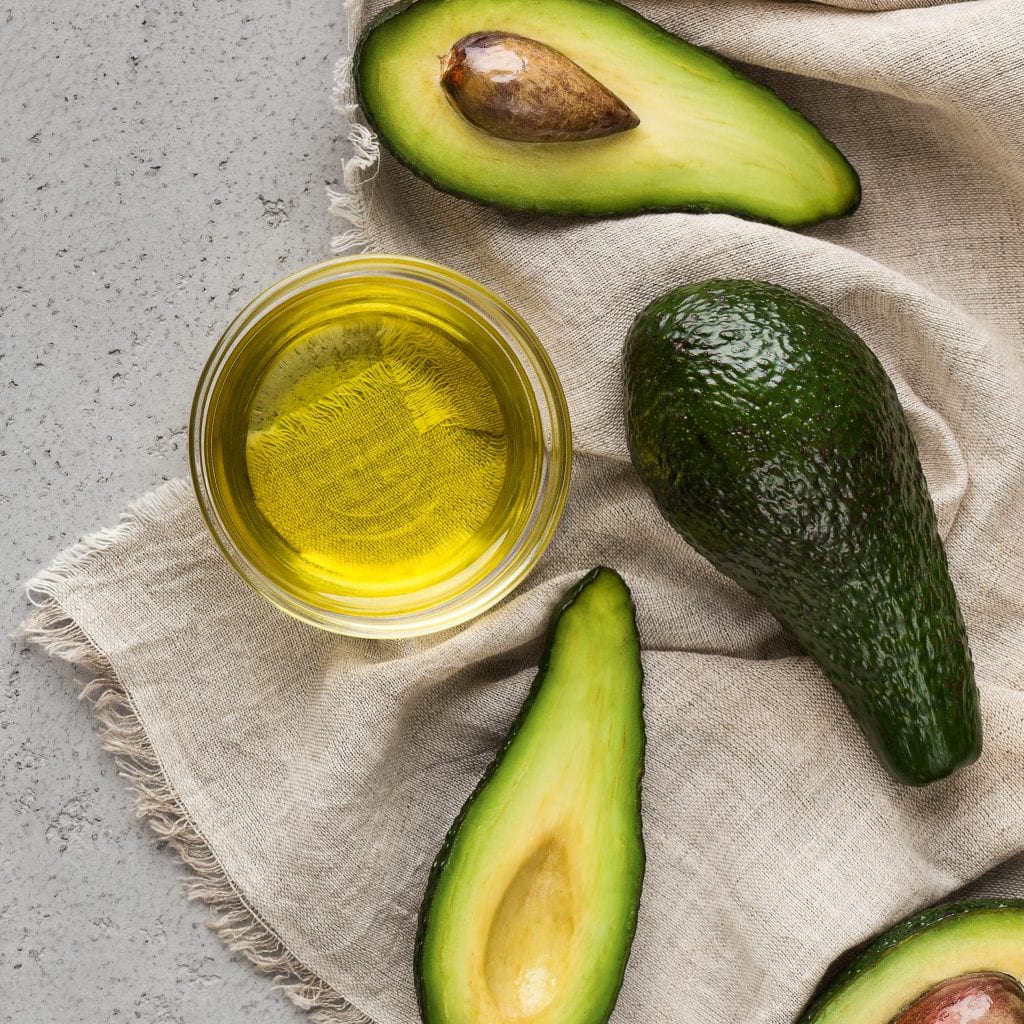Studies show that consumption of certain oils can lead to heart disease, diabetes and even cancer.

So what is the best oil for seasoning cast iron kitchenware?
This post covers everything you need to know about choosing oil for cast iron cooking. I’ll go over the healthiest options while showing you which to avoid.
Why Does Good Cooking Oil Matter?
Choosing the proper cooking oil for your cast iron is important because using polyunsaturated fats has damaging consequences on your health. These adverse effects include:
- Heart disease
- Cancer
- Diabetes
- Alzheimer’s disease
- Stroke
In the 1960s, Ivan Frantz conducted one of the most detailed and well-funded studies that shed light on the damaging effects of polyunsaturated vegetable oils.
This study, called The Minnesota Coronary Survey, took several years to set up and used over 9000 participants.
In short, Frantz controlled everything participants ate. Everyone had the same food, but one group enjoyed meals cooked in butter while others ate food cooked with polyunsaturated vegetable oils.
After five years, Frantz found that those who ate food fried in vegetable oil died sooner and had a lower quality of life.
But why is polyunsaturated vegetable oils so harmful?
Americans eat six tablespoons of vegetable oil per day, and it’s impossible to naturally consume this amount of polyunsaturated fats. It takes 98 ears of corn to make five tablespoons of corn oil. If manufacturers want to produce grapeseed oil, they’ll need over 600 grapes.
And since these synthetic oils oxidize quickly, you’re slowly damaging cells and proteins in your body, increasing the risk of mortality.
So what are the healthiest oils to use for your cast iron cookware?
Top 5 Best Cooking Oils For Cast Iron Seasoning
Stick to these options when shopping for cast iron seasoning:
- Coconut oil
- Avocado oil
- Olive oil
- Beef tallow
- Macadamia nut oil
1. Coconut Oil
One serving of coconut oil contains 100 grams of fat, and 87 grams of this is saturated fats. Unlike polyunsaturated fats, which are fragile and oxidize quickly, saturated fats are stable and won’t oxidize when exposed to heat.
You might be thinking coconut oil is harmful before it mainly has saturated fats. However, several studies like the Minnesota Coronary Survey, Sydney Study and the Women’s Health Initiative show that the opposite is true.
Here are some science-backed benefits of using coconut oil:
- It contains 70% MCT oil
- Coconut oil is antibacterial
- You feel more energetic
MCTs or medium-chain triglycerides are fat that turns into ketones, and your brain cells love ketones since it protects them against stress. Studies show that MCTs boost cognitive function and help manage dementia and Alzheimer’s.
Also, 50% of coconut oil is lauric acid. This lauric acid is a precursor to monolaurin, a compound that destroys the fat around viruses, boosting immune function.
The third benefit is more energy. MCT oil doesn’t rely on digestive enzymes, so your body can use it immediately. This immediate boost in ketones increases energy.
The only problem with coconut oil is it hardens at 74 degrees Fahrenheit. So you’ll need to microwave it before seasoning your cast iron.
2. Avocado Oil
Opt for avocado oil if you don’t feel like microwaving coconut oil and want a more convenient way to season cast iron.
One serving of avocado oil contains:
- 100 grams of fat
- 12 grams of saturated fat
- 70 grams of monounsaturated fat
- 13 grams of polyunsaturated fat
So although avocado oil offers the same amount of fat per serving as coconut oil, it only has 12 grams of saturated fat. Avocado oil also has polyunsaturated fats, so you’ll want to use it with caution since excessive consumption can lead to oxidation.
Avocado is packed with essential nutrients like potassium, vitamin E, lutein and omega 9. In addition to being nutrient-dense, avocado offers benefits like:
- It fights inflammation
- Decreases the effects of sugar
- Avocado oil’s smoke point is 520 degrees Fahrenheit
If you want to reduce the effects of junk food on your body, opt for avocado oil when seasoning your cast iron cookware. You might even want to cook your steaks and vegetables in avocado oil to lower inflammation.
Some studies found that specific properties in avocado oil can reduce inflammation more than popular drugs.
My favorite benefit is that it decreases the effects of sugar. This is helpful after eating a cheat meal.
Lastly, avocado oil is a practical option if you’re cooking at high temperatures because it has a high smoke point. You can heat it up to 480 degrees before it starts to smoke.

3. Olive Oil
Studies show that a phytonutrient in olive oil called phenol protects your cells against oxidation. Olive oil is also nonstick so you won’t struggle with stuck pieces of food.
One serving contains:
- 100 grams of fat
- 14 grams of saturated fat
- 10 grams of polyunsaturated fat
- 72 grams of monounsaturated fat
- Trace amounts of iron and vitamin K
Unlike coconut oil, olive oil doesn’t harden, so you don’t have to put it in the microwave. Simply pour a thin layer onto your cast iron skillets, rub it into the surface with a paper towel and bake for 30 minutes at 400 degrees Fahrenheit.
The only problem with olive oil is that most brands add additives like:
- Canola oil
- Preservatives
- Chlorin
This makes the bottle last longer, and companies save money. But these additives are toxic, so you want to get natural olive oil.
Healthy olive oil is picked and cold-pressed immediately without any additional ingredients. An easy way to know if your olive oil is natural is to dip a teaspoon in it and taste the oil. If it gives you a slight tickle or cough in the back of your throat, you know you’ve bought the correct oil.
But if it tastes bland, then it contains canola oil.
Another red flag to look out for is the bottle. Is it a glass or plastic bottle? If the olive oil is in a glass bottle, it’s more likely to be real. Plastic bottles show that the manufacturer is trying to save money, so they probably also added canola oil.
4. Beef Tallow
Although beef tallow isn’t an oil, it’s a practical option for seasoning your new cast iron skillet.
Like coconut oil, beef tallow mainly contains saturated fat resistant to oxidation. After seasoning your cast iron pan with beef fat, you’ll also notice a unique flavor when cooking food.
One serving of beef tallow contains:
- 100 grams of fat
- 50 grams of saturated fat
- Four grams of polyunsaturated fat
- 40 grams of monounsaturated fat
- Trace amounts of vitamin D
Medically reviewed papers even show beef fat and bacon grease can help you lose weight. It does this in three ways:
- Beef tallow is packed with CLA
- It keeps you fuller for longer
- It decreases cravings for carbs and sweet treats
CLA is a form of fat in food that promotes fat burning, and by coating your pan with beef tallow, you’re increasing your consumption of CLA, making weight loss easier.
Tallow is also filling because it has saturated fat and zero carbohydrates. This lets you fast for longer, lowering insulin levels and cravings and increasing weight loss.
But the best part about beef fat is it’s super affordable. This makes it perfect if you’re seasoning your cast iron dutch ovens on a budget. Farmers throw tallow away after cutting livestock, so if you can connect with a farm in your area, you can get it for almost nothing.
5. Macadamia Nut Oil
Macadamia and peanut oil is a lesser-known cooking oil, but it’s healthy due to the low omega 6 levels. It’s the oil with the second-lowest omega 6 content behind coconut oil.
You’ll notice a yummy nutty taste after cooking food on a skillet with macadamia oil. One serving contains:
- 76 grams of fat
- 12 grams of saturated fat
- 60% oleic acid
This high concentration of oleic acid improves cardiovascular health and lowers your risk of developing health disease.
Now that we know the best oils for cast iron seasoning, let’s look at some oils to avoid.
Read our guide to the best oils for air fryers!
Cooking Oils To Avoid
Here are some common oils to avoid:
- Flaxseed oil
- Canola oil
- Soy oil
- Corn oil
- Grapeseed oil
Flaxseed Oil
When shopping for a cast-iron skillet, you’ll find that most companies use flaxseed oil to pre-season your cast iron pans.
Although flaxseed oil is high in omega 3, it sticks like glue. Many cast iron enthusiasts, including myself, used flaxseed oil in the past, followed the seasoning directions and food still stuck to the pan.
The reason why flaxseed oil is so inconsistent is because of the variety. You get refined, unrefined, cold-pressed and shelf-stabilized oil, producing different results. Flaxseed oil also has a low smoke point so it isn’t a practical option for high heat.
Canola Oil
Even though canola oil can help prevent food from sticking to your skillet, it’s highly refined and will wreak havoc on your body. I’d recommend sticking to a more natural oil like coconut or olive oil.
Manufacturers make canola oil by crushing, bleaching, and heating thousands of seeds.
So this long, industrial process is dedicated to ripping oil out of tiny seeds. It’s impossible to consume this naturally, so your body triggers inflammation.
Soy Oil
Soy oil is 50% unsaturated fats, making it an oil to stay away from during the seasoning process. Also, soy oil isn’t an effective non-stick oil, so food sticks to the surface even after seasoning your pan.
Studies on mice found that consuming soy oil made them fatter than mice eating fructose.

Corn Oil
Because manufacturers heat corn oil several times during the manufacturing process, it’s highly oxidized. This oxidation leads to inflammation and several long-term health problems.
Instead, opt for coconut, olive or avocado oil. These oils don’t go through an industrial process, and the high saturated fat content makes them resistant to oxidation.
Grapeseed Oil
Grapeseed oil is 70% omega 6, making it one of the most unstable and fragile oils.
Grapeseed oil is more common in Europe, but its popularity is rising in the US as manufacturers realize how cheap this oil is to produce.
There are leftover grape seeds after the winemaking process, and companies use hexane to extract oil from these seeds. This hexane is a toxic chemical that irritates the lungs, throat and nose.
The end result is a mutated, unstable oil with no nutritional value.
Read our guide to the Best Spatula For Cast Iron Cookware!
Final Thoughts On The Best Cast Iron Seasoning Oil
Choosing the right oil for your cast iron equipment is essential. Not only do the wrong oils cause your food to stick, but it’s also unhealthy and can lead to long-term health problems.
If you’re looking for a stable, nutritious oil for cast iron seasoning, opt for coconut, olive, avocado or macadamia nut oil. You could even use beef tallow since it’ll give your meals some extra flavor.
However, avoid refined vegetable oil like canola, soy, flaxseed, corn, grapeseed and sunflower oil. These oils are unstable and will oxidate the proteins and cells in your body.
Written by
Matt Gaedke
Matt is a former college basketball player turned computer engineer who discovered his passion for health and nutrition after cutting sugar from his diet in 2016. That year he founded KetoConnect with Megha in order to share their ketogenic lifestyle through recipes, videos, and educational content. Matt is always seeking to grow and try new things, a passion he shares with his wife and two amazing sons.


Leave a Comment